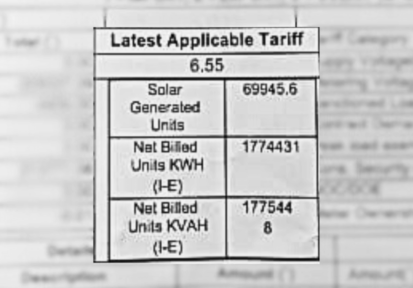For most Indian businesses, electricity is no longer a predictable monthly expense. It has become
Read MoreNet metering is the process where if Your Solar Power plant Generates more electricity units than your Consumption, then through the net metering process you can sell extra power generation to the local/connected power grid and you will receive credits that reduce your electricity bill.
But Every one, may have Question before choosing Solar Net Metering facilities with their Solar System. Is net metering really worth to invest in India?


Case Study for Reference only:
Plant Capacity: 1 MW
Solar Unit Generated (random month bill)= 69,945
Total consumption of factory in reference month – 2,47,388
Net Bill Unit for Payment to Discom= 1,77,443.1
In the above solar net metering original bill, you’re only billed for your net energy use. If the solar panels produce more electricity than the customer uses, the surplus is sent back to the grid. The customer receives credits for the electricity they send back to the grid. At the end of the billing period, the customer is only billed for the net energy used.
The solar net-metering policy is available to residential, commercial, and government-owned buildings.
Yes, net metering is a worth investment in India in 2025. It lets you earn credits for excess solar power—reducing your bills and making your system more cost-effective—if local policies and your energy needs align.
Jatin Singh is a content developer at Sun Photonics Pvt. Ltd., specializing in creating impactful content for solar energy solutions. With a background in tech and health, he has previously worked in digital marketing and pharma. Passionate about sustainability, and currently exploring all things about solar!
For most Indian businesses, electricity is no longer a predictable monthly expense. It has become
Read MoreWinters expose every weakness in a rooftop solar system — moisture, fog, temperature swings, metal
Read MoreAs India accelerates its path toward clean and sustainable green energy, the role of Solar
Read MoreIndia’s energy sector is transforming rapidly, and commercial rooftop solar has emerged as a core
Read More